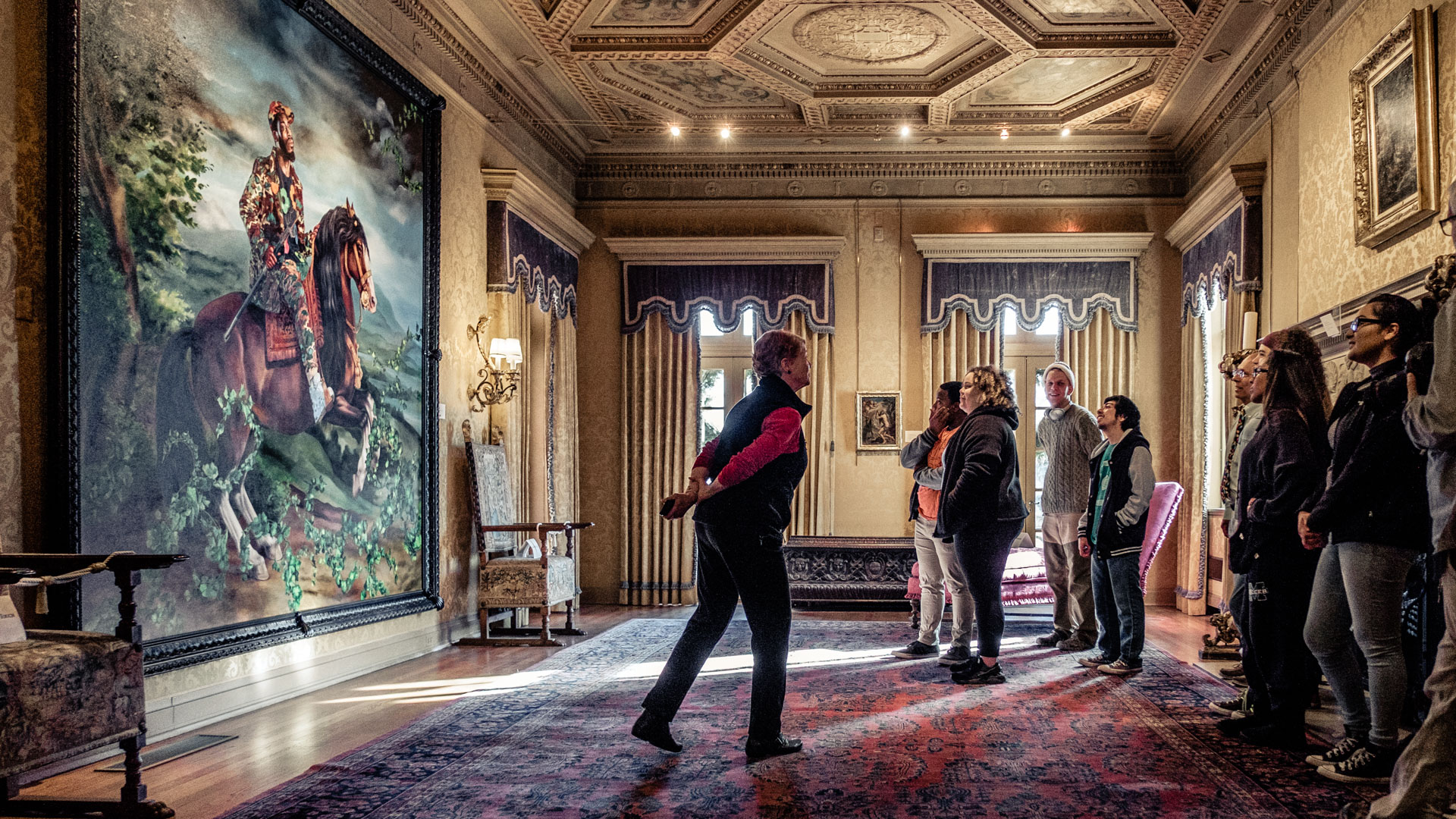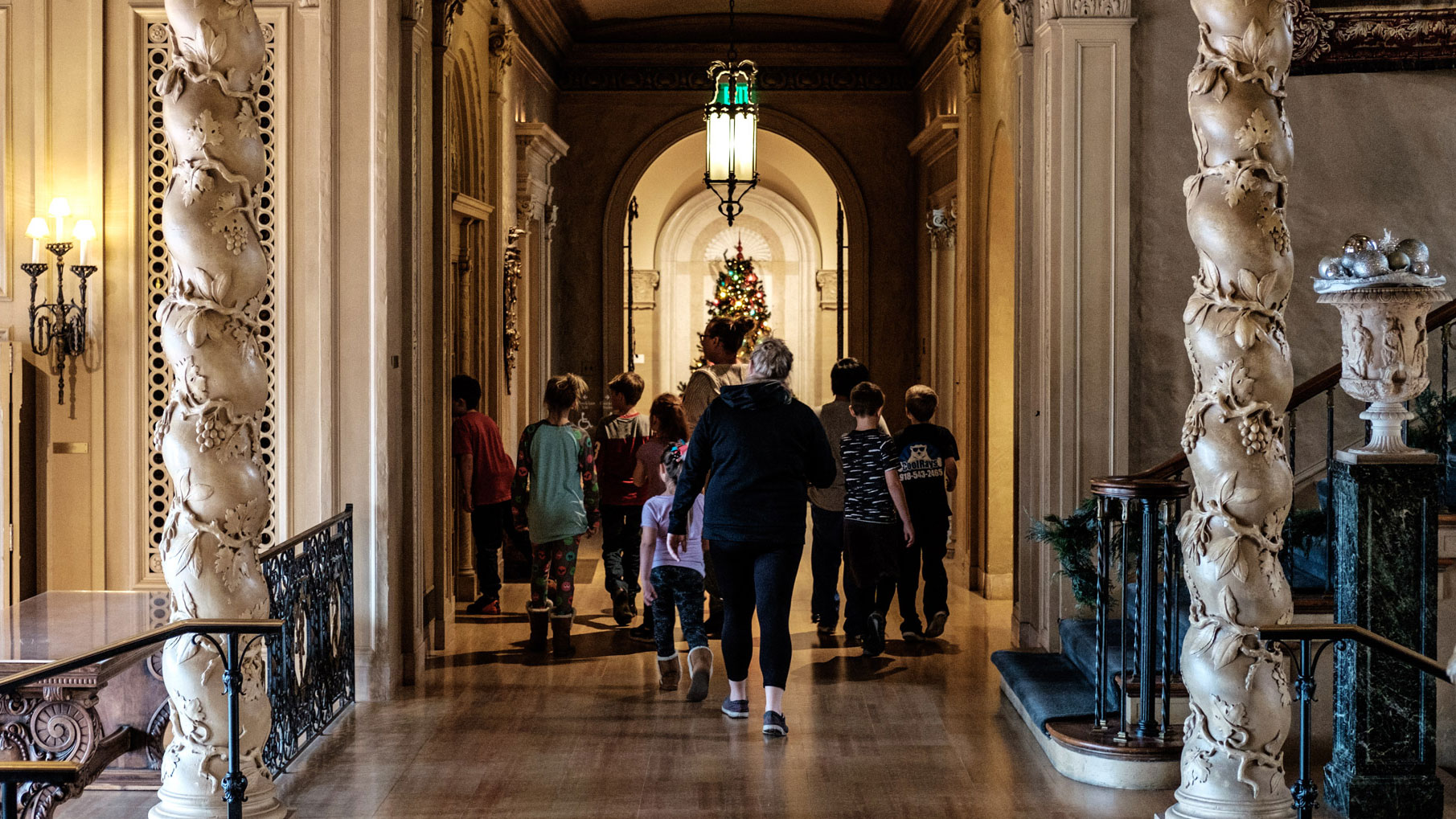Becoming a Docent
Applications for Fall 2023 – Spring 2024 are currently closed. Thank you for your interest!
What is a docent?
The word “docent” (pronounced doe-sent) is derived from the Latin word docere, meaning ‘to teach’. Docents are trained by museum staff to act as guides, interpreters, community representatives, and much more!
Docents are essential to the educational mission of Philbrook. They are enthusiastic volunteers who share their passion for art, history, and gardens to connect our visitors to the museum.
What do Philbrook docents do?
Docents lead public tours for all ages at the museum. They use different engagement techniques to start conversations about art, culture, history, and the world around us. They help visitors think critically and creatively while connecting them to the collection, the gardens, and each other.
Docents help with museum programs and events as greeters, wayfinders, or an extra pair of hands where needed.
Docents represent the museum at outreach events including festivals, block parties, art fairs, and other community gatherings with partner organizations.
Some docents also sit on the IDEA Subcommittee- an internal group dedicated to promoting policies that encourage inclusivity, diversity, equity, and accessibility within the volunteer corps. This group makes suggestions for training topics and assists with recruitment and retention efforts.
And some docents have leadership positions on the Docent Council. The council organizes social events and educational outings, distributes an internal newsletter, and advises on tour and program functions.
Who can become a docent?
Anyone with a passion for art, history, gardens, and a desire to inspire is welcome to apply. There are no educational or professional requirements for becoming a docent. Docents will be trained by museum staff on everything they need to know.
Philbrook respects, values, and celebrates the unique attributes, characteristics, and perspectives that make each person who they are. We believe that our chief strength lies in human diversity, both within our organization and among the visitors and communities with whom we engage. We seek out diversity of participation, thought, and action, and work affirmatively and strategically to be inclusive. For us, diversity, equity, inclusion, and accessibility are drivers of organizational excellence.
What are the benefits of being a docent?
Docents receive specialized training by museum staff and professional speakers. Those who complete the training will emerge with a comprehensive understanding of the museum’s collections as well as practical skills in public engagement, community outreach, and best practices in diversity, equity, inclusion, and accessibility.
Docents are invited to special events and parties throughout the year in addition to an annual volunteer recognition luncheon. We emphasize community building as much as continued education. Philbrook is a place to make lifelong friendships and to be a part of an amazing team.
How do I become a docent?
Complete the online Docent Application form. Candidates will be selected to interview between June and August. Those accepted into the new docent class will begin their training in September.
Beyond being able to commit to the training hours and requirements, we’re looking for candidates who are enthusiastic, flexible, and committed to the museum’s mission and values. Successful docents work as members of a team and enjoy working with visitors of all ages.
Philbrook’s Mission
Philbrook’s Values
Is there a minimum time commitment required to be a docent?
Docents are not required to give a certain number of hours to stay in the program after graduating. Some volunteer a few hours each month while others are here several days of the week.
Volunteer opportunities are available during the work week, select evenings, and weekends.
New docents are asked to attend 2-3 trainings each month from September to May. Each training is one and a half hours long. In addition to the live, in-person training sessions, recordings are offered in the form of video links to increase access to the program.
Over the course of a year, the total time commitment for trainings is about 30 hours. Additional requirements including meetings, tour shadowing, and practice tours are estimated up to 20 more hours of your time. This equates to about 6 hours of your time each month.
What flexibility can I expect as a docent?
We understand that each docent has different needs. Our docent training program is offered both in-person and via recordings so all can learn at their own pace. Upon becoming a docent, there is no minimum amount of hours required to stay in the program.
Docents choose to volunteer with the tour groups, events, and programs that best suit them. They are never assigned work.
What accessibility options are there for docents?
Touring docents with physical or mobility needs can give stationed tours, remaining in one room or outdoor area while tour groups cycle through. Docents can use stools or chairs during tours. Seating can be provided during events and festivals as needed.
If you have questions about additional accessibility options at Philbrook, please contact Melissa Ski at mski@philbrook.org or 918-748-5309.
What support will I receive as a docent?
Mentors will be assigned to incoming docents at the start of the program. Mentors help create a warm and welcoming environment for new recruits, monitor their progress in the program, and offer their advice and experience throughout the first year.
The Manager of Tours and School Programs is the primary contact and staff liaison for the docents. They oversee the program and maintain an open door policy for any questions, concerns, or suggestions from the docent corps.
Docent Applications are currently closed.



